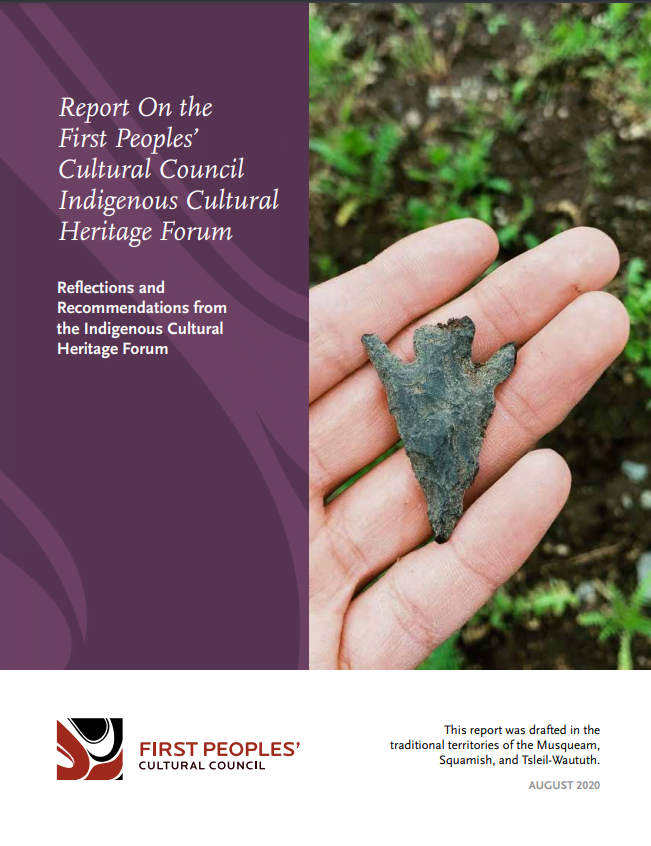23 search results
Recommendation 1:
Acknowledge that the cultural heritage of Indigenous Peoples belongs to and should be managed by Indigenous Peoples. Without exaggeration, 99.9% of archaeological sites in British Columbia, extending back in time more than 10,000 years, are those of Indigenous Peoples. Yet Indigenous Peoples have had little say in or control over decisions made concerning their study, preservation, or destruction.
-
Category and theme:
Audience:
Groups affected:
Recommendation 2:
Recognize that the Indigenous understandings of Indigenous cultural heritage are both tangible and intangible and are holistic, integrated, fulsome, and inclusive. This will require moving away from the narrow focus on ‘archaeological’ material culture currently common to the interpretation of the heritage legislation such as the Heritage Conservation Act and the delineation of a set date of 1846 as archaeological in nature.
-
Category and theme:
Audience:
Groups affected:
Recommendation 3:
Support Indigenous communities’ and their Knowledge Keepers’ efforts to revitalize and maintain all forms of Indigenous Cultural Heritage. This support should be through funding for strategic planning and monitoring efforts, capacity building and training, networking and learning opportunities, research and documentation, and infrastructure development.
-
Category and theme:
Audience:
Groups affected:
Recommendation 4:
Develop a framework, action plan and timeline to fully implement the United Nations Declaration on the Rights of Indigenous Peoples and Bill C-41/Declaration on the Rights of Indigenous Peoples Act (DRIPA). UNDRIP recognizes the right of Indigenous Peoples to “maintain, control, protect and develop their cultural heritage.” The Province of B.C. has committed to implementing UNDRIP and DRIPA/Bill 41, and investment in this plan will align with that commitment by providing opportunities for Indigenous-led management of Indigenous cultural heritage. This framework and action plan must establish jurisdiction and statutory decision-making authority over Indigenous cultural heritage by Indigenous Peoples. For this to be successful, it will require decentralizing power and developing or activating mechanisms for extending authority within existing legislation to Indigenous Peoples. British Columbia’s current Bill C-41 / Declaration on the Rights of Indigenous Peoples Act (DRIPA) provides a mechanism for developing such legal mechanisms, processes, and relationships.
-
Category and theme:
Audience:
Groups affected:
Recommendation 5:
Eliminate any influence on Provincial policies and legislation of colonial doctrines including the Doctrine of Discovery and terra nullius in relation to Indigenous cultural heritage and more generally. This includes removing the 1846 distinction date for recognition and protection of archaeological sites, properties, and objects under the Heritage Conservation Act.
-
Category and theme:
Audience:
Groups affected:
Recommendation 6:
Support anti-racism initiatives and education for and about Indigenous Peoplesby working with the Ministry of Education and developing resources for public education at all levels.
-
Category and theme:
Audience:
Groups affected:
Recommendation 7:
Establish and enhance relational versus transactional connections between governments based on Indigenous rights recognition, Government-to-Government and/or Nation-to-Nation foundations of equality, and through development and implementation of shared decision-making processes addressing Indigenous Cultural Heritage. This requires displacing the current standards of engagement / consultation / accommodation, based on unilateral government decision-making and strength of claim assessments, and replacing them with new standards as set out above. It also requires significant education, training, and revised hiring practices to ensure government have the capacity to undertake these processes in an effective way.
-
Category and theme:
Audience:
Groups affected:
Recommendation 8:
Set out measures for special identification, recognition, and protection of intangible heritage. It is recommended that B.C. support the 2003 UNESCO Convention for the Safeguarding of Intangible Cultural Heritage (the Convention) by articulating in legislation and regulations the means by which intangible Indigenous cultural heritage is identified, recognized, and protected.
-
Category and theme:
Audience:
Groups affected:
Recommendation 9:
Harmonize statutory and operational relations between provincial agencies such as the Archaeology Branch and Heritage Branch of the Ministry of Forests, Lands, Natural Resource Operations and Rural Development. This requires better communication and strengthened relations between provincial agencies dealing with Indigenous cultural heritage, including the Ministry of Indigenous Relations and Reconciliation as a key facilitator of relations.
-
Category and theme:
Audience:
Groups affected:
Recommendation 10:
Harmonize relations, approaches, legislation, policies, and funding opportunities between Canada and British Columbia to support Indigenous Peoples in managing their cultural heritage to establish more cohesive, holistic, and integrated approach.
-
Category and theme:
Audience:
Groups affected:
